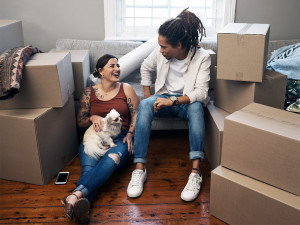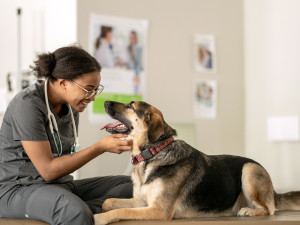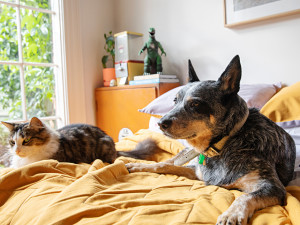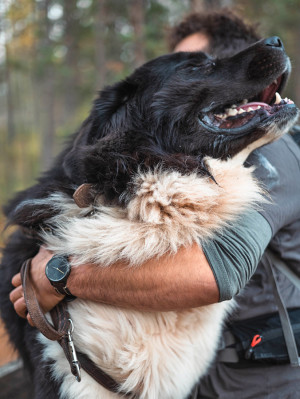How To Safely Surrender Your Pet If You Have No Other Choice
It should be a last resort, and there are plenty of options to explore first, but here’s how to surrender your pet safely if you have to

Share Article
Taking on a pet is a lifetime commitment. It’s one that includes financial responsibilityopens in a new tab and emotional responsibility. There will probably be (some) difficult times. On the other hand, it’s also the beginning of an incredible journey full of loveopens in a new tab.
Every so often, a pet parent may feel that they are in a position where they need to give their pet up. It’s worth noting that more people than ever are finding themselves in this position right now, due to the cost of living crisis. The latest figures from Dogs Trustopens in a new tab reveal that in 2022 they had 7,875 dogs handed over to them by owners who could no longer look after them. The same year, the RSPCA announced a six percent rise in dogs being surrendered to themopens in a new tab and a 30 percent drop in adoptions. However, as we’ll discuss below, there is help available.

Get (totally free) deals for food, treats, accessories, tech and way more pet parenting must-haves.
opens in a new tabThere are of course other reasons a pet parent might feel as if they have no option but to give their pet up. From behavioural issues to lifestyle changes, it’s always worth finding an expert to talk it through with first.
Do I have to give my pet up?
“ Giving up a petopens in a new tab should always be a last resort as it’s an incredibly difficult decision to make, and can be really upsetting for everyone involved, including the animals.” The RSPCA tells us.
For those dealing with financial constraints, there are a number of resources out there that can help pet parents over the hump, whether it’s free nutrition consultations to help you find an affordable diet that doesn’t put your pet’s health at risk, to pet food banks. There’s also vet payment plans, alternative ways to buy medication and charities providing free or low cost vet treatments. More info hereopens in a new tab.
If it’s behavioural issues that are driving you towards the decision of giving up your pet then there are behaviourists and trainers that can help pet parents deal with any number of issues. Finding the right behaviouristopens in a new tab can be key for this.
What if I’ve explored all options?
Even after all this some pet parents may still find they have no option but to give their pet up. If you are unable to continue to provide a loving home for your pet, then it’s important that you seek a new home for them in a responsible way.
“First, you could try to contact their breeder or original seller to see if they’re willing to take them back,” say the RSPCA. “If your pet was adopted from a rescue organisation, then it is usually policy that they must be returned to them so please contact them for advice.” Alternatively, you can speak to family and friends to find out if any of them are in a position where they might be able to meet your pet’s needs and welcome them into your home. If none of these are a possibility then you should contact a charity or rescue centre for help. You can find your local rescue centre (for cats and dogs) via the Association of Dogs and Cats Homesopens in a new tab.
“Unfortunately, animal rescue organisations are under a huge amount of strain at the moment and most centres are full with long waiting lists. If you need to rehome your pet, try different organisations and please be patient – you may need to wait for a space to open up,” the RSPCA explains. “While the RSPCA doesn’t generally take in unwanted pets (because our centres prioritise animals being rescued by our inspectors from cruelty and neglect), there are other charities that specialise in this work.”
“Some charities have rescue centres which will take animals in, others use fosterers to care for animals in their homes while they search for an adopter, and some may try to help find your pet a new home while they stay with you, to reduce the disruption they’re experiencing. You will be asked to sign a document that explains that you’re passing ownership of your pet over to the charity to rehome.”
Is it safe to rehome my pet via social media?
“We would not advise owners to rehome their pets online or via social mediaopens in a new tab as it is difficult to ensure your pet is going to a home where they will be well looked after, and we’d never advise offering your pet as ‘free to a good home’.’ The RSPCA also stresses that owners should never abandon their pets. “It is incredibly distressing for them and can also leave them in extremely vulnerable situations.” Sadly, last year they responded to 20,999 reports about animals being abandoned – more than in 2022, 2021 and 2020.
If you do decide to go against advice and rehome your pet privately to a person you do not know, then it is advised that you meet them in person, with your pet, more than once, to get an idea of how they interact with the pet. Make sure you ask them lots of questions. And ask for their contact details. Perhaps the new owner will be happy to stay in touch and provide updates. On the flipside, you may be able to advise on any issues that come up as your pet settles into their new homeopens in a new tab.
The RSPCA has rehomed 405,839 pets in need of a new home since 2013 thanks to its network of 140 branches and animal centres across England and Wales – which equates to 111 animals every day.

Jess Commons
Jess is a writer, editor and former global lifestyle director at Refinery29 with previous stints at ITV, Grazia, The Debrief (RIP) and more. She is a sucker for an older gentleman cat with A Past and spends most of her time being told what to do by her toddler and her three-legged rescue cat, Mac.
Related articles
![vet smiling at dog]() opens in a new tab
opens in a new tabA Vet Explains How To Keep Your Pet’s Medical Bills Low This Winter
As a vet working in emergency practice, I often see cases where these bills could be reduced or avoided altogether
![cat and dog laying on bed together]() opens in a new tab
opens in a new tabWhat’s the Deal With Pet Insurance?
It covers your pet so you can get that broken leg fixed – while keeping your wallet happy
![a woman with curly hair smiles down at her daschund]() opens in a new tab
opens in a new tabHow Much Does it Cost to Have a Dog?
We got our paws on a calculator and did the research so you don’t have to
![Newfoundland dog in the arms its owner]() opens in a new tab
opens in a new tabThe Most Expensive Dog Breeds to Insure (How to Reduce Your Pet Insurance Premium)
How to get that insurance premium down (without sacrificing your pup’s health)
![a woman hugging her cat with blonde hair]() opens in a new tab
opens in a new tabHow Much Does A Cat Cost?
Not sure if you can afford to bankroll a new cat for the rest of its life? Check out our comprehensive guide for all the costs involved
![A dog lying on a rug with a litter of puppies feeding from her.]() opens in a new tab
opens in a new tabWhy You Shouldn’t Adopt a Pet From Social Media or Buying/Selling Sites
It’s not quite the same as buying secondhand clothes…









